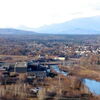
Processing Your Payment
Please do not leave this page until complete. This can take a few moments.
Historic preservation bonds seen as economic drivers for communities across Maine
At the Waldo Theatre, in Waldoboro, workers from Coastal Copper and Slate, of Rockland, Monday were finishing up work on a new roof for the 83-year-old building.
In Augusta, scaffolding fronts the worn facade of the Colonial Theater, with little indication of the progress that's made inside the building, that was long neglected before a group started work on bringing it back to life.
While nonprofit development projects on the buildings and dozens of others across the state may seem like a labor of love that doesn't have much to do with the business community, Greg Paxton of Maine Preservation said that's a misconception.
"A theater can be the glue that holds a community together," Paxton said. Bigger picture, "They have a big impact on a local economy. The people who attend a show at the theater are going to use the restaurant down the street."
The two buildings are among 77 on a list of buildings owned by municipalities and nonprofits across the state — many of them theaters, but a variety of other buildings as well — that would get a boost from two bond issue bills aimed at historic preservation.
While the state budget was approved earlier this week, the Legislature is still considering a long list of proposed bonds. While the historic preservation bonds aren't in the $239 billion bond package proposed by Gov. Janet Mills, those supporting them still hope they will be considered this year, and have asked they be combined into one package, with two parts, Paxton said this week.
LD 126 would replace the $1.25 million Historic Preservation Revolving Fund with the Historic Places for Maine's Future Fund, and refund it. The bond was approved in 2010, but then frozen until a rule could be developed for their use. After the rule was approved, $200,000 was used before the rest of the fund expired. The fund would be used by nonprofit organizations and local governments to acquire significant historic properties, stabilize or rehabilitate them, and then sell them at or above appraised value to private owners who agree to preserve and rehabilitate them.
$5 million LD 423 provides matching grants for rehabilitation of property listed on or eligible for the National Register of Historic Places. The bill has a focus on the state’s maritime and agricultural history — up to 20% of the funding would be to privately owned historic property that has a significant association with either of the two industries.
Maine Preservation, a nonprofit that works to support historic building restoration, has sold seven buildings in the last three and a half years that had been vacant or underused.
"These buildings are providing new tax revenue, as well as generating jobs [with their renovation work], and being put into active use," Paxton said.
Paxton said historic renovation projects like the Waldo and Colonial theaters have a big impact on a town. Both theaters are on Maine Preservation’s List of Most Endangered Places as well as the National Register of Historic Places.

'Backbone of any community'
Residents in Waldoboro, a Lincoln County town on the Medomak River, with a population of 5,000, formed a board of directors last summer and began working fundraising and renovation, which is expected to cost $750,000.
Phase 1 of the restoration focused on replacing the roof, moisture remediation and repairing and upgrading the electric and plumbing systems. Phase 2, expected to begin soon, will focus on the interior. Phase 3 will complete the interior and exterior renovations and technology upgrades next year.
Businesses in town are solidly behind the project, Town Manager Julie Keizeer told WGME in December. "A theater like this is the backbone of any community," she said.
The 86-member Waldoboro Business Association in a news release in February, said, it “looks forward to the time when the Waldo Theatre is once again the center of our cultural, social, and commercial endeavors."
"The Waldo afforded a cultural focus to Waldoboro’s downtown village, and the WBA believes in and encourages the re-creation and transformation of that focus with a 21st century twang. When it once again opens its doors to all Midcoast communities, the Waldo Theatre will restore vibrancy to Waldoboro village and reclaim its important role as a collaborative partner with schools, businesses and nonprofits.”

Return on investment
Work on Augusta's Colonial Theater began in 2009. The building hadn't been used for anything but storage since the 1960s and water damage and time had taken their toll.
The work is expected to cost as much as $8 million, with $1 million raised. An executive director, Peter Bezemes, was hired last month. He's the nonprofit's first executive director.
That project, too, has the support of downtown Augusta businesses.
Tom Johnson, founder of Capitol Computers next door, donated the vacant lot on the other side of the theater for a 13,000-square-foot addition that will meet Americans with Disabilities Act requirements, and have dressing rooms, rehearsal space, elevators, and a cafe and art gallery.
Beyond the theater renovation, the ultimate goal of the project is to revitalize the north end of Augusta’s downtown and help boost the city’s economy.
Michael Hall, executive director of Augusta's Downtown Alliance, told Mainebiz last year that studies show that for every dollar spent on a project like the Colonial, $3 is spent by those who attend events there.
The city is also working with the groups that run the Waterville Opera House and Gardiner’s Johnson Hall so that the three venues along the Kennebec complement each other.

History working for communities
Johnson Hall is also on Paxton's list of buildings that need renovation money, as are buildings from Arrowsic to West Gouldsboro. Portland has four — the Abyssian Meeting House; Fort Gorges; the Greater Portland Landmarks headquarters at 93 High St.; the Maine Irish Heritage Center, in the former St. Dominic's Church; and the Masonic Temple, 415 Congress St.
He said the state's extensive stock of historic buildings is an asset to development.
"It's very difficult to name a community that's revitalized successfully," in which historic preservation hasn't been a part.The bills, he said, will be catalysts to get the projects — most of which are progressing, like the Waldo and Colonial — finished.
Aside economic impact, the savings associated with "recycling" an old building, and embracing the state's history, the buildings give communities a sense of place.
He said historic preservation projects rarely raise negative feelings in a community. When a historic building is rehabilitated, "Everybody feels pride and a sense of accomplishment."
There are hundreds of such projects in the state. "They just need the resources to get going.'













0 Comments